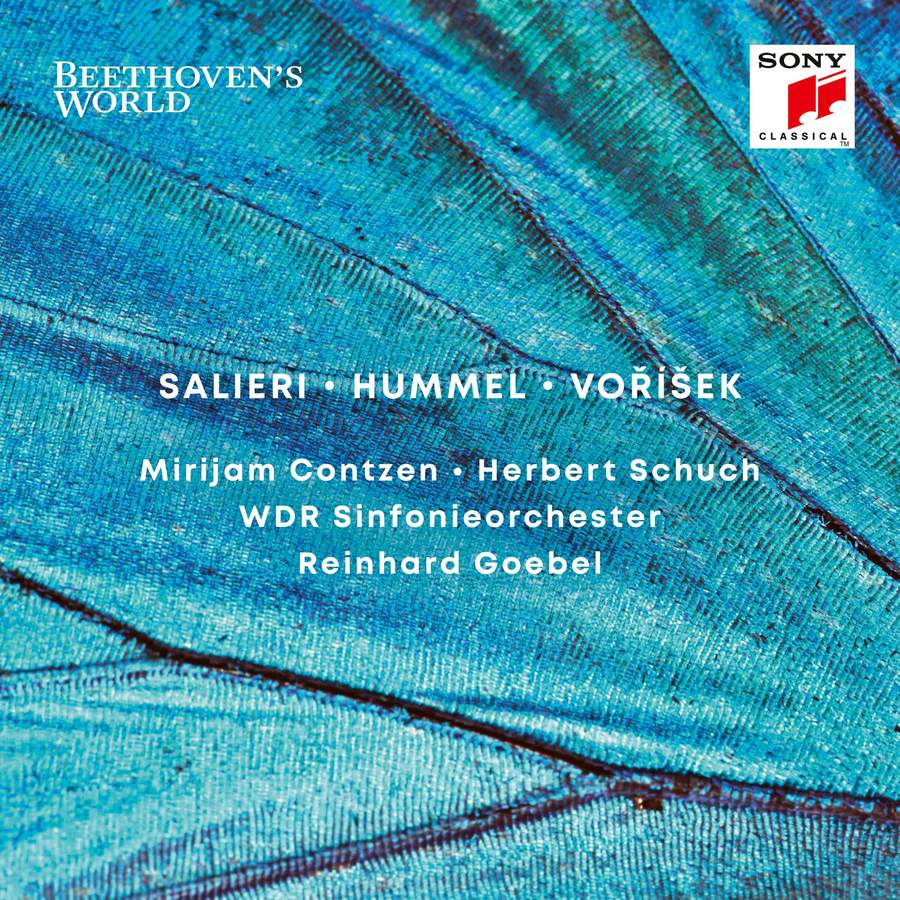Beethoven's World: Salieri, Hummel, Vorisek
View record and artist detailsRecord and Artist Details
Genre:
Orchestral
Label: Sony Classical
Magazine Review Date: 09/2020
Media Format: CD or Download
Media Runtime: 78
Mastering:
DDD
Catalogue Number: 19075929602

Tracks:
| Composition | Artist Credit |
|---|---|
| (26) Variations on 'La follia di Spagna' |
Antonio Salieri, Composer
Reinhard Goebel, Conductor WDR Symphony Orchestra |
| Concerto for Piano, Violin and Orchestra |
Johann Nepomuk Hummel, Composer
Herbert Schuch, Piano Mirijam Contzen, Violin Reinhard Goebel, Conductor WDR Symphony Orchestra |
| Symphony |
Jan Václav Hugo Vorísek, Composer
Reinhard Goebel, Conductor WDR Symphony Orchestra |
Author: Richard Wigmore
‘Beethoven’s World’ proclaims the jewel case of an entertaining, offbeat programme no one could have predicted. Active in and around Vienna during the first quarter of the 19th century, all three composers had contact with the master. Around 1800 Salieri had given Beethoven informal lessons in the Italian vocal style. Another Salieri pupil, Hummel, developed a friendship of sorts with Beethoven, though unsurprisingly relations between the two men could be fraught. Half a generation younger, the short-lived Bohemian Jan Václav Voříšek studied with Hummel and was praised by Beethoven, who touchingly asked his own doctor to attend him in his final illness.
While each of the three works is worth hearing, they become successively more interesting. Salieri’s treatment of the ‘Follia’ theme made famous by Corelli, Vivaldi and others is essentially an orchestral showpiece. The 26 variations – arguably a dozen too many – seem randomly ordered, with no attempt at an over-arching plan. Some are plain banal. But there are ear-tickling effects involving harp and cavorting solo violin, a catchy fandango variation and another intriguingly scored for trombones, flute and rumbling timpani.
In his day Hummel was touted as ‘Mozart’s musical heir’. You can hear why in his early (1804) Double Concerto, a polished, euphonious work that deploys Mozartian gambits (the very opening cribs from the Piano Concerto K456) with charm and verve. There is charm, too, in Voříšek 's sole symphony of 1823, but something more besides. Here and there the outer movements can evoke Beethoven’s Second, a work Voříšek often conducted (and, incidentally, a favourite of Schubert’s). The grinding contrapuntal development in the Andante distantly recalls the Eroica’s funeral march. But the émigré Bohemian was no mere epigone. His symphony is a work of impressive command, firmly constructed, melodically attractive and deftly scored (the wind-writing is a constant delight). Most original is the truculent D minor Scherzo, unusually (unprecedentedly in a scherzo?) in 9/8 time, with stinging cross-rhythms and capricious phrase-lengths. If any composer comes to mind here, it’s Dvořák.
Performances by the excellent WDR Sinfonieorchester, given something of a period makeover by Reinhard Goebel, do this music proud. They play up the sometimes garish flamboyance of the Salieri and bring a mingled exuberance and lyrical grace to the Voříšek – biting rhythmic precision, too, to the Scherzo. The wind evidently enjoy their solo opportunities. In the Hummel concerto the pianist is very much first among equals. Herbert Schuch, in tandem with the lithe-toned Mirijam Contzen, phrases and colours with a sensibility and wit that go beyond mere good taste. The finale, based on a popular dance tune, has an ideal relaxed buoyancy, with the reams of decorative figuration kept sparkling and transparent. If you fancy these three particular works – and it’s a fair bet they’ll never appear on the same disc again – you can hardly go wrong here.
Discover the world's largest classical music catalogue with Presto Music.

Gramophone Digital Club
- Digital Edition
- Digital Archive
- Reviews Database
- Full website access
From £8.75 / month
Subscribe
Gramophone Full Club
- Print Edition
- Digital Edition
- Digital Archive
- Reviews Database
- Full website access
From £11.00 / month
Subscribe
If you are a library, university or other organisation that would be interested in an institutional subscription to Gramophone please click here for further information.




